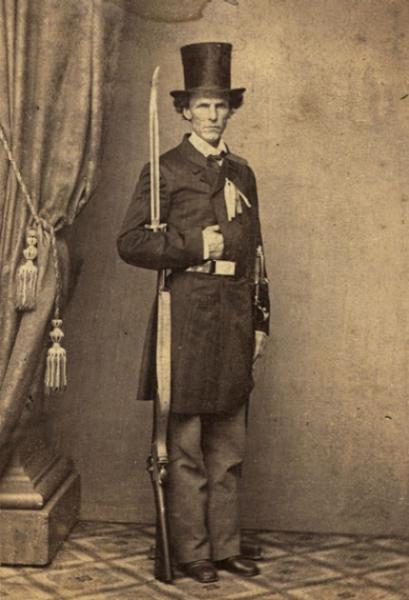By Christopher Phillips, University of Cincinnati
Biographical Information:
- Date of birth: June 22, 1814
- Place of birth: Lawrenceburg, Indiana
- Claim to fame: Lieutenant Governor of Indiana, 1849-1853; Indiana Congressman, 1853-1855; Senator of Kansas, 1861-1866; General of Lane's Brigade and 1st Kansas Colored Volunteers; jayhawker; opposed Price's Raid; namesake of Lane University and Lane County, Kansas
- Nickname: "Jim Lane"
- Political affiliations: Democratic Party, Republican Party
- Date of death: July 11, 1866
- Place of death: Leavenworth, Kansas
- Cause of death: Suicide
- Final resting place: Oak Hill Cemetery, Lawrence, Kansas
James Henry Lane, a U.S. congressman, senator, and federal general, was born in Lawrenceburg, Indiana, the son of a lawyer and U.S. congressman. A lawyer himself, Lane served admirably as a colonel of an Indiana volunteer regiment during the Mexican-American War. In 1849 he was elected Indiana’s lieutenant governor and in 1853 he was elected to Congress. Lane’s vote in favor of the Kansas-Nebraska Act, which opened much of the western territories to slavery’s introduction, ruined his political reputation among Free-Soil voters in Indiana. In 1855 he moved to Kansas, joined the Free-State movement, and became one of its more notorious leaders.
As an electrifying orator, Lane presided over the 1855 Topeka convention that framed an extralegal, antislavery state constitution and directed the fortification of Lawrence against invading Missourians during the “Wakarusa War” (a skirmish between Free-Staters and proslavery factions in the Lawrence area). In 1856 Lane went to Washington to seek statehood for Kansas, and, when unsuccessful, the self-styled “crusader for freedom” opened a route of emigration to Kansas previously denied when the Missouri legislature closed the Missouri River to Northern emigrants. When he returned to Kansas, Lane waged a paramilitary war with other jayhawkers against proslavery “border ruffians.”
Operating under the Free-State Wyandotte Constitution, the state legislature elected Lane as Kansas’s first U.S. senator in 1859, and he finally took his seat in 1861 when the former territory became a state. He organized a “Frontier Guard” to protect President Abraham Lincoln in Washington, D.C., thus beginning an intimate friendship which gave Lane great influence in the management of Kansas affairs.
The brutality of William Quantrill’s 1863 raid on Lawrence was in part a retribution for Lane’s actions at Osceola. He managed to escape into a nearby cornfield before vengeful raiders destroyed his home.
In June 1861, Lincoln appointed Lane brigadier general of volunteers, with authority to raise two regiments. This “Kansas Brigade” participated in actions in western Missouri and in Kansas, raided and confiscated the property of Missouri slaveholders (including slaves), and assisted fugitive slaves to escape. Lane adopted “hard war” tactics (targeting economic and other nonmilitary assets of the enemy) early in the Civil War, and he achieved notoriety for the bombardment and near complete destruction of Osceola, Missouri, on September 23, 1861 (including the home of U.S. senator Waldo P. Johnson, who would leave his seat in outrage to join the Confederate army and later its Congress as one of Missouri’s senators) and the summary execution of nine civilian prisoners taken after the action. The brutality of William Quantrill’s 1863 raid on Lawrence was in part a retribution for Lane’s actions at Osceola, and Lane himself was targeted. He managed to escape into a nearby cornfield before vengeful raiders destroyed his home.
He also was one of the first Union leaders to recruit black soldiers into the federal army. Acting as recruiting commissioner for Kansas in summer 1862, Lane raised the 1st Kansas Colored Volunteers, one of the first black regiments. Comprised mainly of fugitive slaves from Missouri and Arkansas, it was the first black regiment that saw action in the war (at Island Mound in Bates County, Missouri, on October 27-29, 1862). The regiment was officially mustered into the U.S. Army on January 13, 1863.
From History to Pop Culture: In the novel True Grit, and in two movies of the same name, the character Rooster Cogburn was a native of Osceola, who joined up with Quantrill's Raiders after Jim Lane's Sacking of Osceola. The 1969 film featured John Wayne in the role, for which he won an Academy Award.
Returning to his Senate seat in 1864, Lane maintained unflagging support for Lincoln’s reelection, urging western Republicans to do so as well. He also served as a delegate to the National Union Party (the party name Republicans used to attract Northern Democrats’ votes) convention in Baltimore. In the Senate, he proved a strong advocate of western expansion, supporting the Homestead and Pacific Railroad bills and helping to secure land grants in Kansas for the construction of railroads.
Supporting President Lincoln’s position, Lane took a moderate political stance with regard to the readmission of former Confederate states following the war’s conclusion. He broke with the “Radical Republicans” over harsh Reconstruction measures toward the former Confederate states, and he publicly supported President Andrew Johnson’s veto of the 1866 Civil Rights Bill, even though Lane had in fact voted for it. He then voted against overriding the president’s veto. His changed stance brought almost universal condemnation from Radicals in Washington and from Republican voters at home in Kansas.
Having returned to Lawrence on business and in a state of depression brought on in part by overwork, but also by the public censure he received over his votes and changed politics, Lane shot himself while riding with his brother-in-law on a carriage at his brother-in-law’s farm near Leavenworth, Kansas, on July 1, 1866. He died 10 days later.
Suggested Reading:
Castel, Albert E. A Frontier State at War: Kansas 1861-1865. Ithaca: Cornell University Press, 1958.
Collins, Robert. Jim Lane: Scoundrel, Statesman, Kansan. New York: Pelican, 2007.
Spurgeon, Ian Michael. Man of Douglas, Man of Lincoln: The Political Odyssey of James Henry Lane. Columbia: University of Missouri Press, 2008.
Cite This Page:
Phillips, Christopher. "Lane, James Henry" Civil War on the Western Border: The Missouri-Kansas Conflict, 1854-1865. The Kansas City Public Library. Accessed Saturday, April 20, 2024 - 04:33 at https://civilwaronthewesternborder.org/encyclopedia/lane-james-henry


